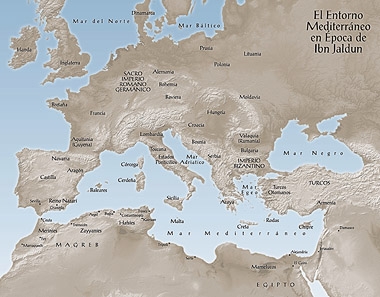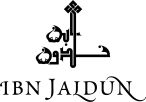Ibn Khaldoun - the world’s most renowned Muslim
Ibn Khaldun, observer of his time
The references in admiration of Ibn Khaldun come from thinkers of different times and places.
"The life of Ibn Khaldun is a clear reflection of the world to which he belonged. A world that was full of reminders of the fragility of human effort. His career showed just how unstable the interest groups that kept the dynasties in power actually were. The meeting with Timur (Tamerlane) near Damascus showed the extent to which the rise of a new power could affect life in towns and villages".
A. Hourani, A History of the Arab Peoples
Ibn Khaldun's life
Ibn Khaldun's life is relatively well-documented, as he wrote an autobiography, published by Muħammad ibn-Tāwīt at-Tanjī, Cairo 1951) in which numerous documents regarding his life are quoted word-for-word. However, the autobiography has little to say about his private life, so that little is known about his family background. Generally known as "Ibn Khaldūn" after a remote ancestor, he was born in Tunis in 1332 C.E. (732 A.H.) into an upper-class Andalusian family, the Banū Khaldūn. His family, which held many high offices in Andalucia, had emigrated to after the fall of Seville to Reconquista forces around the middle of the 13th century. Under the Tunisian Hafsid dynasty some of his family held political office; Ibn Khaldūn's father and grandfather however withdrew from political life and joined a mystical order.
In his autobiography, Ibn Khaldun traces his descent back to the time of Muhammad through an Arab tribe from Yemen, specifically the Hadhramaut, which came to Spain in the eighth century at the beginning of the Islamic conquest. In his own words: "And our ancestry is from Hadhramaut, from the Arabs of Yemen, via Wa'il ibn Hajar, from the best of the Arabs, well-known and respected." (p. 2429, Al-Waraq's edition). However, the biographer Mohammad Enan questions his claim, suggesting that his family may have been Berbers who pretended to be of Arab origin in order to gain social status. According to Muhammad Hozien, "The false identity would be valid however at the time that Ibn Khaldun's ancestors left Andulsia and moved to Tunisia they did not change their claim to Arab ancestry. Even in the times when Berbers were ruling, the reigns of Al-Marabats and al-Mowahids, et al. The Ibn Khalduns did not reclaim their Berber heritage." This would lend credence to his claim of Arab origin.
Source: Wikipedia
The First Modern Historian
Qadi of the Maliki
Ibn Khaldun has said of Egypt "He who has not seen it does not know the power of Islam." While other Islamic regions had to cope with border wars and inner strife, under the Mamluks Egypt experienced a period of economic prosperity and high culture. However, even in Egypt, where Ibn Khaldūn lived out his days, he could not stay out of politics completely. In 1384 the Egyptian Sultan, al-Malik udh-Dhahir Barquq, made him Professor of the Qamhiyyah Madrasah, and grand Qadi (supreme judge) of the Malikischool of fight or religious law (one of four schools, the Maliki school was widespread primarily in West Africa). His efforts at reform encountered resistance, however, and within a year he had to resign his judgeship. A contributory factor to his decision to resign may have been the heavy personal blow that struck him in 1384, when a ship carrying his wife and children sank off the coast of Alexandria. Ibn Khaldun now decided to complete the pilgrimage to Mecca after all.
Source: Wikipedia





